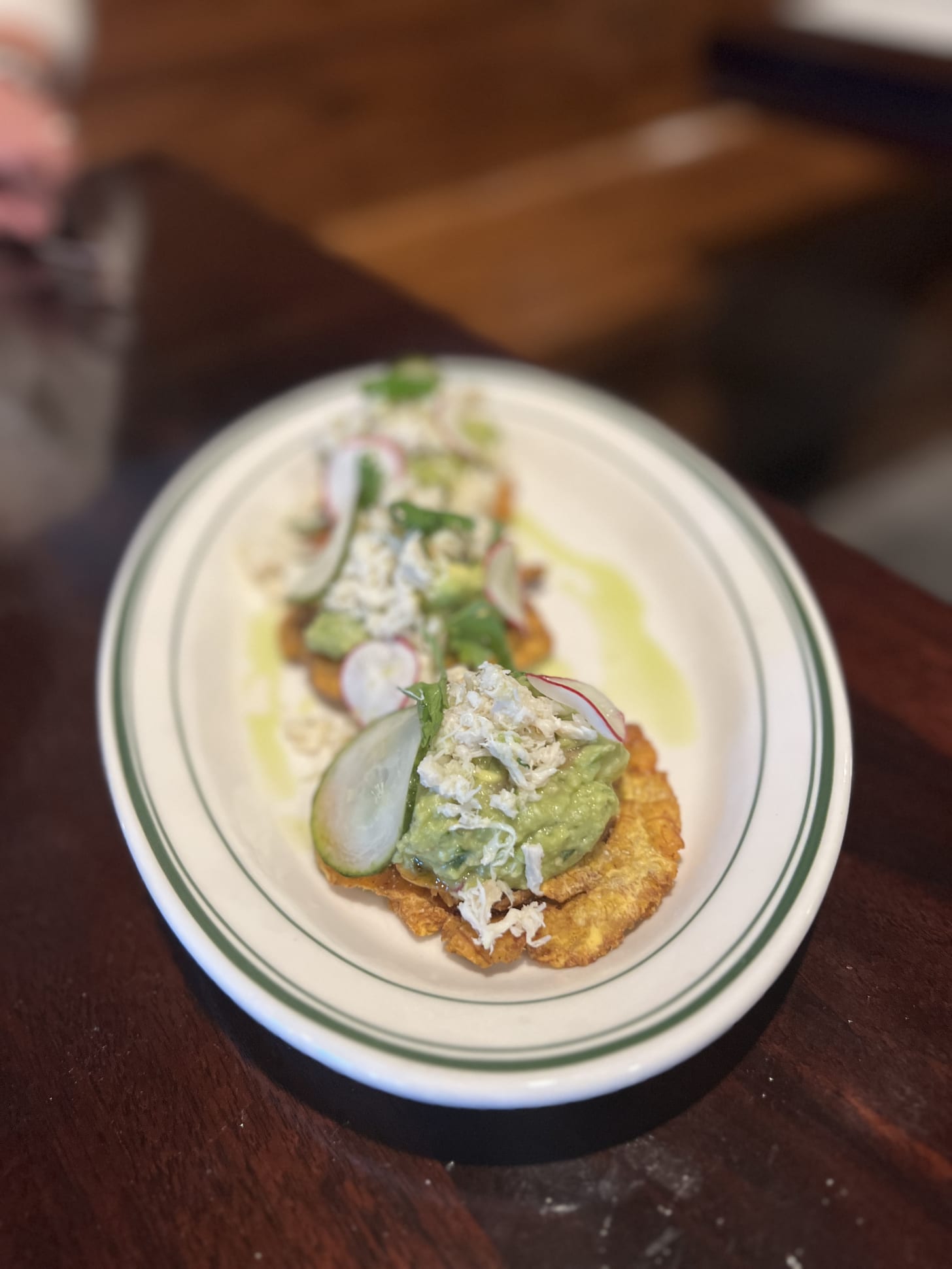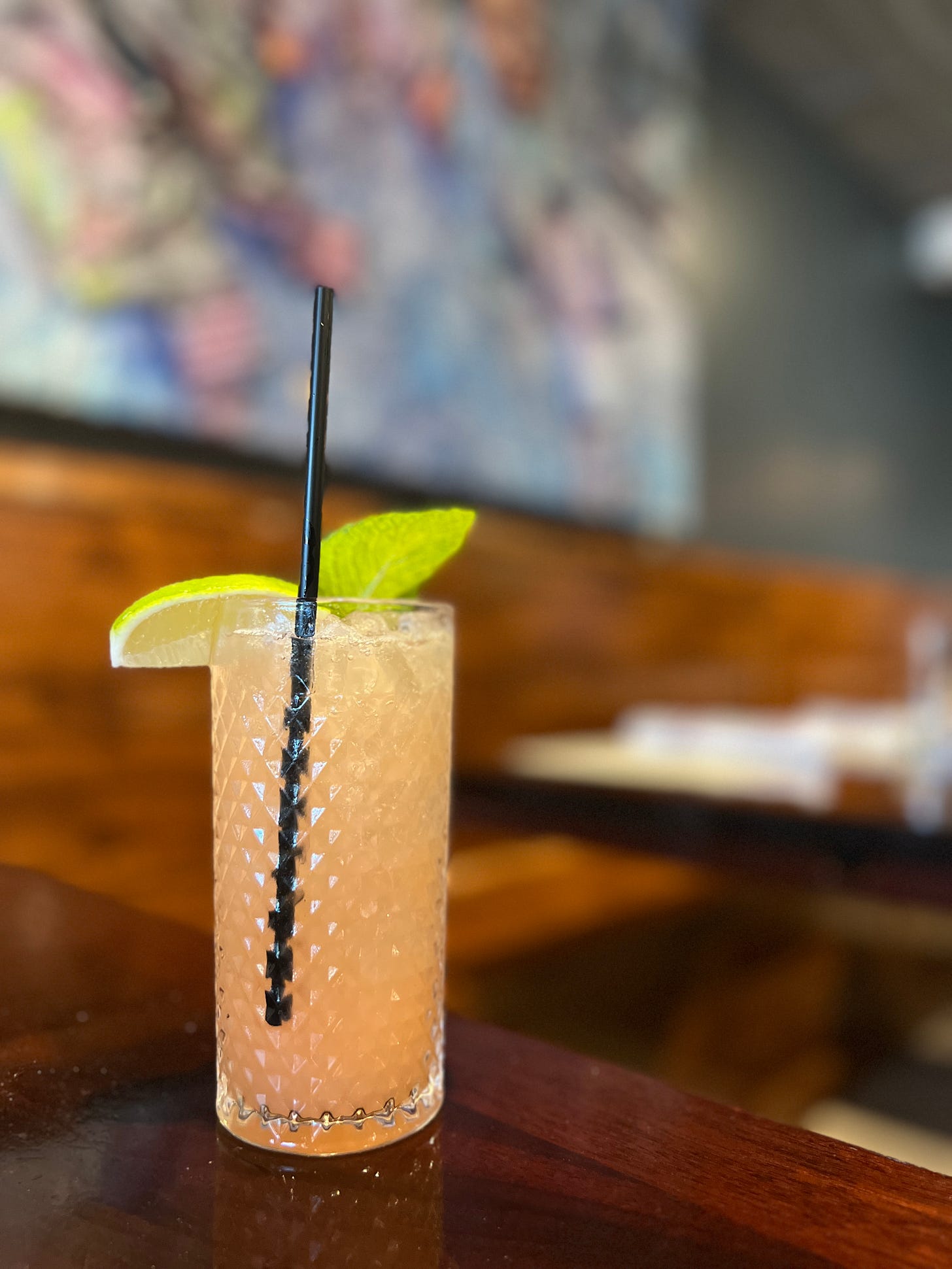Unsung
A review of two greats in music and food
If you’ve ever wanted to hear what it might sound like if my writing was narrated by a certain rapper who likes gin and juice1 (listen above) this week’s voice recording/podcast is pretty special. It’s worth the $5 subscription if you’re a free subscriber.
What do you call the being whose every utterance is a concordance of hope, despair, pain and joy, their voice a golden chord unshackled from the prison of the heart?
What is the being in its flesh that floats past, brushes your shoulder, but ultimately, because of a combination of your own fear, poor self-consideration, and your aggrandizement of them, is regarded as spectral?
This metaphor on which we often lean here is “angel”. We do so, because it’s easier to consider those who seem above or unobtainable as otherworldly than it is to realize the shortcomings of our own humanity.
But angels do not text their mothers near the soundboard at The Empty Bottle after a funereal set of dirges and hopeful laments seemingly plucked on King David’s harp right before they play an encore.
Angels do not compose songs, unsung and unplayed for years because their families can’t afford instruments.
Angels are not native-born Kenyans tricked by Bob Dylan to upend their whole lives for the frigid realities of Minneapolis.
Angels are not Ondara.
Ondara is better than angels.
He is everything an artist should be, studied, devoted, and preternaturally talented.
It is clear he’s been born to do this, so it’s fair to say he’s been at this thing for three decades, or if we drop the mythology, about ten years, the point at which he taught himself to play guitar.
A decade, the falsetto of a castrato, and the longing heart of the living haunted should be enough for super-stardom. For now it’s worth 75 or so souls in a bar in Chicago on a Thursday night.
Which is maybe enough.
He lives. He creates. He tours.
In life, one, the self, is enough. One more, or two, is a privileged communion.
If we get more, we get more.
But, so many who do not deserve it, get more than they should, and so many who do deserve it, do not.
Ondara deserves it all.
So does chef Mark Mendez, but thus far, despite his immense talent, he has been criminally underrated in Chicago.
He once cooked pan-Latin cuisine for arena-sized crowds at Carnivale. This should have been the Super Bowl halftime appearance that made Mendez’s career, for Carnivale was the Hope Diamond in a restaurant empire full of jewels like Marche, Gioco, and Red Light.
But, in any of those restaurants he would have been overshadowed by the owner, the brightest light, the alligator boot and velour-tracksuit-wearing-AMG-Mercedes-convertible-driving Jerry Kleiner.
Mendez knew this and so he went after the truth with his wife Liz Mendez. For six years, they promulgated the best Spanish party outside Barcelona at Vera in Chicago’s West Loop.
Before Vera I thought sherry was either a stripper, what you cooked with, or what my grandma drank. Who knew it was a regional delicacy, a delicious exercise in oxidation, sweetness, and salinity? Liz did and she showed Chicago.
At Vera Mark somehow made morcilla, aka blood sausage, so good, some of my young work colleagues who’d just moved here from suburban Iowa ate the tender strips up like McDonald’s French fries.
A ruddy fleshed haunch of a pasture-raised Iberico hog always commanded the room. Curvaceous and constantly shaved, rosettes of jamon with pearlescent fat-flecked flesh dangled over patron’s mouths like meat fruit roll-ups.
If you visited Vera once, you were family.
The Mendezes had a great six year run, but they were also too early for the McDonald’s/Steph Izard/Google revolution that came to the area later. Vera was shrouded by the elevated train in a hard to park in part of town.
Restaurant ownership saps your entire life. It is not enough to be a chef or a sommelier. You must be accountant, marketer, and therapist. No matter how much you love the game, the game rarely loves you back on a single unit. As Lettuce Entertain You, Boka, and One Off Hospitality know, it’s empire or bust.
So the Mendezes reclaimed balance in their lives and did other things. Vera was enough though that I would follow wherever the Mendez clan went when the timing was right.
Now is the time. Mark has ended up partnering with Marcos Rivera (he and his family ran the legendary Las Palmas in Bucktown) on a trio of restaurants in Evanston including Libertad, Zentli, and Estación. Liz, who amongst other things writes the Substack newsletter On Cue, is not directly involved. As Mark’s life partner, her guidance is still ever present.
He said, “I talk to her every day about what I’m working on, problems I encounter, my struggles, and her insights and knowledge have helped me have whatever success I have had. Without her there is no Chef Mark Mendez.”
Mark’s mother was from southern Illinois and his father from Utuado, Puerto Rico. His mother learned to cook Puerto Rican food from Mark’s paternal grandmother. He said, “We ate mofungo, bacalao, pernil, arroz con pollo not only because my dad liked that stuff but we were broke as fuck and that food was inexpensive.”
Mark learned to cook the food of his youth from his mom, one of the first dishes he ever made was tostones or crushed fried plantains. Today he adapts what he learned to a professional kitchen making traditional Puerto Rican seasoning blends and base flavors like sofrito, adobo, and sazon in house.
I chose to visit Estación because I figured the extra resonance of Mark’s childhood would result in something special. I also chose it because everything I know about Puerto Rico came from J Lo, Lin Manuel Miranda, eating at Papa’s Cache Sabroso, or devouring Jibaritos and rice and beans at Borinquen lounge.
Which is to say as a white Polish kid, I don’t know very much, but I’d like to. Also, you may know this, but if you don’t, the magnificent mayo-slathered jibarito sandwiches fried plantains filled with carne asada or lechon are not native to Puerto Rico, but invented by a Puerto Rican here in Chicago.
I’ve had key Puerto Rican dishes like mofongo, fried green plantains mashed with garlic and pork before. Often, I’ve found many versions dry and underseasoned. I remember Kenan Thompson’s hilarious impression of former Boston Red Sox legend David Ortiz which included Thompson rhapsodizing about mofongo on SNL’s Weekend Update. It was not until I had Mendez’s mofongo soaked in ham broth rife with crisp bacon that I understood fake Ortiz’s enthusiasms.
My own enthusiasms also ran high for Mendez’s crispy tostones subbing in as crackers underneath verdant mounds of bright limey avocado mash adorned with sweet striations of pristine crab.
Adobo chicken skewers glistened with guava BBQ sauce, juicy and sweet, but they did need a touch more salt. The pickles offered the perfect acidic counterbalance.
The chicken paired well with guava mojitos so smooth and dangerous I could see myself killing enough of these to end up babbling outside of Buffalo Joe’s like a Northwestern Wildcat sophomore in search of suicide-sauced drumettes later in the evening.
Just as smooth as the cocktails was service, a warm charming “welcome to our home” level of hospitality. I don’t know for sure, but I suspect someone had called off, because our guy at one point played, maître d, bartender, and server. Near the end of our meal he was servicing twelve tables solo, and somehow pulled it off.
The walls at Estación are lined with large scale paintings featuring indigenous elders surrounded by embedded objects which include work tools, kitchen implements like ladles, and broken keyboards.
They’re striking and beautiful, and while I don’t know for sure, they suggest a tension between the intersection of heritage and evolution through work and technology that resonates with me as a first generation son of a Polish immigrant, and no doubt next-generation sons like Mendez and Rivera.
If there’s any criticism, it’s that the room has a lot of hard surfaces, hard chairs, hard tables, hard floors, and hard banquettes. It’s not uncomfortable, but it’s also a little more utilitarian than many restaurants serving food of this caliber.
There is comfort in a warming stew like sancocho featuring braised short rib that breaks in to silky shards under a fork and falls in to a broth so savory, I pack up the remains, as I joke the next day on Instagram, to inject it directly in to my veins.
Also soothing, caldo santo, another heady broth enriched and sweetened with coconut milk bursting with cracklin’ crusted snapper, crab claws, and curls of pink tender shrimp.
Though I didn’t grow up with these dishes, their execution, and the feeling of contentment they raise in me, make me understand just a little bit of the joy that was found at the Mendez family table back in the day. What’s certain is the kid at that table has always been a star and always will be. He just had to leave Chicago for Evanston so that people could appreciate him.
Ondara’s current tour schedule is here
Estación is located at 633 W. Howard in Evanston
Because I’m an ethics guy, I do want to make clear this is AI generated and not the actual rapper you think it is. But, seriously, how scary is it that we can get so close with AI?






Well deserved praise for Chef Mendez. Though I know that industry people widely recognize his talent and vision, he never had the PR/Social Media machinery behind him to raise his public profile. Thanks to your words and hopefully those of others he may soon receive his due.
It is troubling though, that Jerry Kleiner is once again featured in such a light hearted way - he is often described as a "visionary" or "colorful" restaurant owner, which is analogous to describing Ted Kaczynsky as a quirky mathematician. As one among dozens of victims of Kleiner's scams (Crain's Chicago Business once listed in a lengthy article the many lawsuits filed against him), it galls me that Kleiner has somehow managed to operate in this city as if he actually earned it.
I missed dining at Vera and look forward to trying Chef Mendez’s venues. Thanks for the introduction.